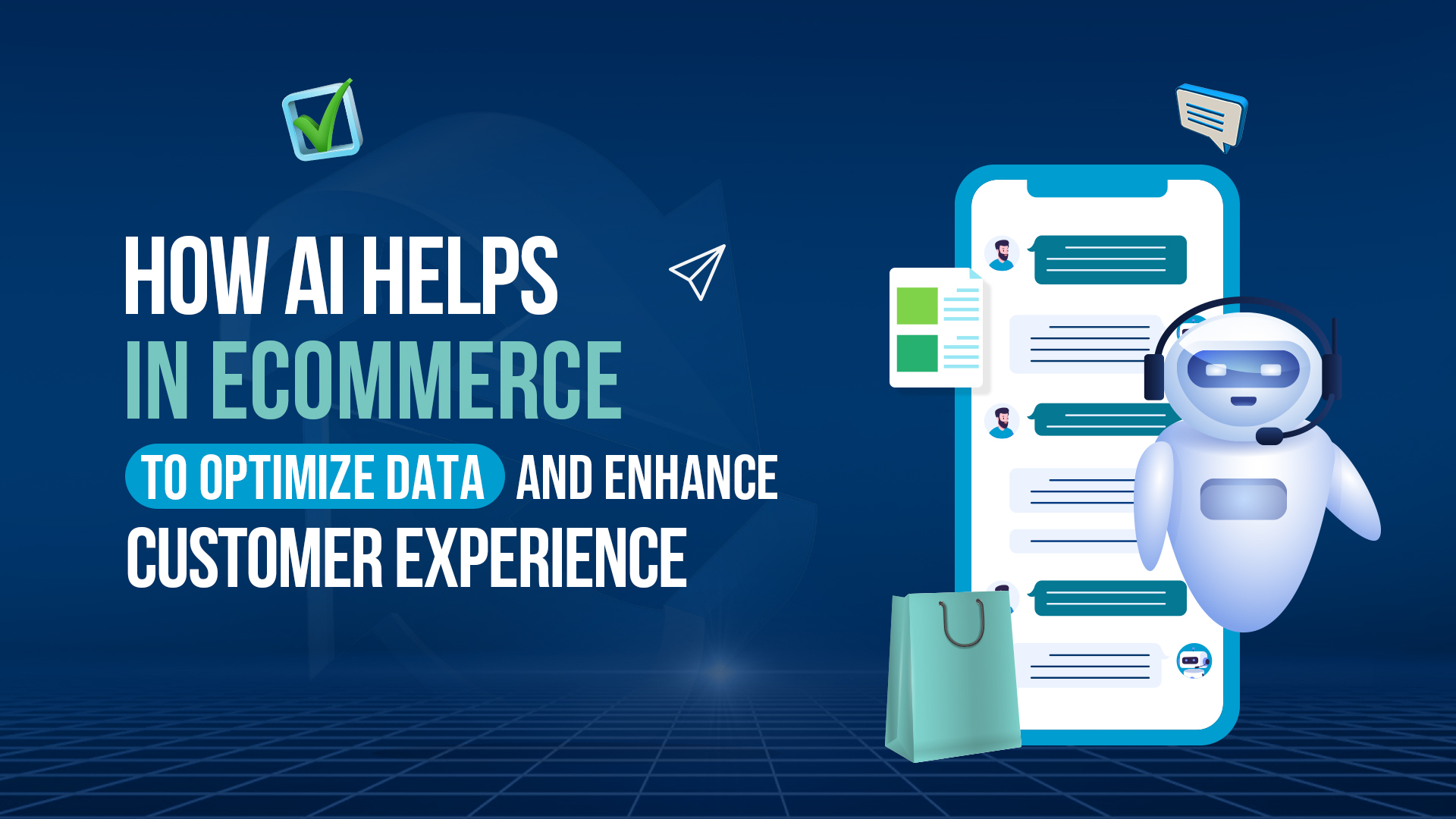In today’s fast-paced eCommerce landscape, staying ahead of the competition means embracing technology. Enter artificial intelligence (AI), a game-changer that’s transforming how online retailers operate. Imagine walking into a store where the staff knows your preferences and suggests products you’ll love. AI makes that possible in the digital world!
From personalized recommendations to streamlined customer service, AI optimizes data to create seamless shopping experiences. As we dive into this topic, we’ll explore how AI not only enhances customer satisfaction but also drives business growth in the eCommerce sector.
Understanding AI in eCommerce
When we hear the term “artificial intelligence,” our minds may wander to sci-fi movies featuring humanoid robots. However, in the world of eCommerce, AI is less about flashy robots and more about sophisticated algorithms and data analysis. Simply put, AI helps businesses make sense of the vast amounts of data generated by customers and transactions.
At its core, AI encompasses various technologies, including:
‒Machine Learning: Algorithms that learn from data to improve their performance over time. Tools like TensorFlow and Scikit-learn are commonly used in eCommerce to develop machine learning models that can analyze customer behavior and make predictions.
‒Natural Language Processing (NLP): This enables machines to understand and interpret human language, enhancing search functionalities in eCommerce platforms. Tools such as Google Cloud Natural Language API and IBM Watson are popular choices for implementing NLP capabilities, allowing retailers to refine their search features and chatbots for better customer interactions.
‒Predictive Analytics: A tool that uses historical data to forecast future trends, helping retailers anticipate customer needs. Solutions like Tableau and SAS Analytics are widely used in eCommerce to perform predictive analysis, enabling businesses to make informed decisions about inventory management and marketing strategies.
With these technologies, eCommerce businesses can optimize their operations, offer personalized experiences, and ultimately boost sales. As we delve deeper into how AI influences various aspects of online retail, it’s clear that leveraging these tools can significantly enhance the customer experience.
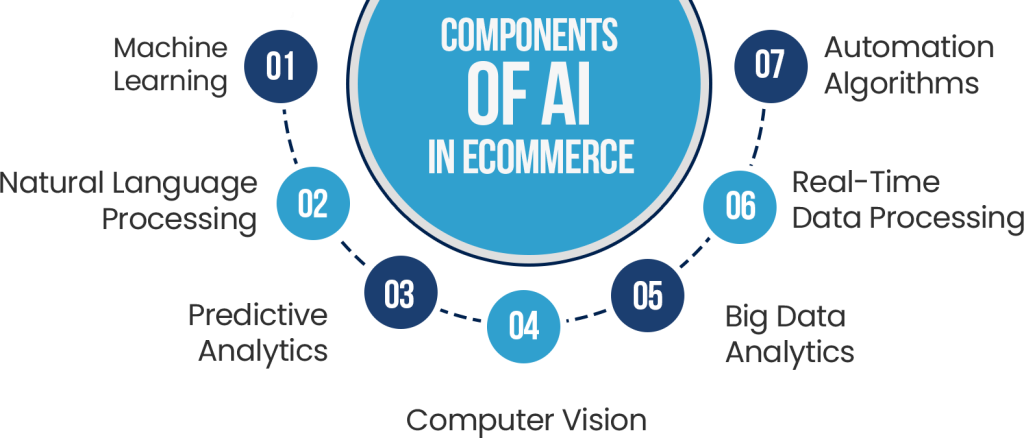
AI-Powered Personalization
AI-powered personalization refers to the use of artificial intelligence to tailor shopping experiences to individual customers. By leveraging algorithms that analyze vast amounts of data, retailers can create unique interactions based on user behavior, preferences, and purchase history. This level of customization not only enhances the shopping experience but also significantly boosts conversion rates and customer loyalty.
How Data Optimization Leads to Personalized Shopping Experiences
At the heart of AI-powered personalization is data optimization. When businesses collect and analyze data from various sources, such as website interactions, previous purchases, and customer feedback they can gain valuable insights into customer behavior. This optimization allows retailers to identify patterns and trends, enabling them to predict what customers are likely to want.
For example, if a customer frequently browses for outdoor gear, the retailer can use this insight to highlight relevant products on their homepage or send personalized email campaigns featuring outdoor equipment. This creates a seamless and tailored shopping experience that resonates with the customer.
Use Cases
- Personalized Product Recommendations
AI algorithms analyze customer data to suggest products that align with their interests. For instance, when a customer buys a pair of shoes, they might receive recommendations for matching accessories or clothing items. This not only increases the average order value but also enhances customer satisfaction. - Tailored Marketing Messages Using Customer Insights
With AI, businesses can send targeted marketing messages based on individual customer preferences. For example, a retailer might send a special discount offer on a customer’s birthday or remind them of items they viewed previously. This personalized approach makes customers feel valued and understood, fostering loyalty and repeat purchases.
Enhancing Customer Experience with AI
AI is transforming the customer experience by introducing innovative technologies that enhance every stage of the shopping journey. From initial engagement to post-purchase support, AI plays a crucial role in creating a smooth and satisfying experience.
AI-Driven Customer Experience Improvements:
‒Predictive Analytics for Customer Behavior: Predictive analytics uses AI to analyze historical data and forecast future customer behavior. By understanding potential buying patterns, businesses can anticipate customer needs and offer relevant products at the right time. For instance, if data indicates a spike in interest for winter apparel as the season approaches, retailers can stock up on these items and promote them proactively.
‒Chatbots for Instant Customer Support: One of the most significant advancements in AI is the development of chatbots. These virtual assistants provide instant customer support, answering queries and resolving issues around the clock. This not only enhances customer satisfaction by providing immediate assistance but also reduces the workload on human customer service representatives.
Statistics on Customer Satisfaction Improvements:
Recent data indicates that customer satisfaction is significantly improving due to the adoption of AI technologies. 56% of CX leaders are actively exploring new generative AI vendors for their customer experience tools, highlighting a growing trend in the industry. Additionally, 70% of these leaders report that generative AI has prompted them to reevaluate their customer experiences. Predictions suggest that 100% of customer interactions will involve AI soon, with 80% of those interactions not requiring human intervention, according to Tom Eggemeier, CEO of Zendesk.
Furthermore, consumer preferences are also shifting in favor of AI solutions. 51% of consumers prefer interacting with bots over humans for immediate assistance, reflecting a growing acceptance of AI in customer service. As organizations continue to embrace AI technologies, these statistics underscore the positive impact of AI on customer satisfaction and service efficiency.
Data Optimization in Online Retail
Data optimization is key to understanding customer preferences and improving business operations. eCommerce businesses collect vast amounts of data from website interactions, transactions, customer feedback, and more. However, the value lies in optimizing this data to extract meaningful insights that drive better decision-making.
AI plays a crucial role in data optimization in online retail by automating data collection and processing. It sifts through complex datasets, uncovering patterns and trends that would be impossible for humans to detect manually. This optimization allows businesses to create more targeted marketing campaigns, enhance user experiences, and make data-driven business decisions.
AI Processes and Analyzes Big Data for Actionable Insights
AI-powered systems are designed to handle large volumes of big data with ease, breaking down silos and delivering actionable insights. For example, machine learning algorithms can analyze customer behavior data to determine which products are likely to sell more during specific seasons or which customers are most likely to churn. By processing this data quickly, businesses can respond proactively to market demands and customer needs.
The Role of Real-Time Analytics in Enhancing Decision-Making
Real-time analytics powered by AI has become a game-changer for online retailers. Real-time data analysis for personalized shopping experiences allows businesses to adjust their strategies on the fly, whether it’s dynamic pricing or real-time product recommendations. For instance, when a customer is browsing a website, AI can analyze their behavior in real-time and suggest products they might be interested in, enhancing the overall shopping experience.
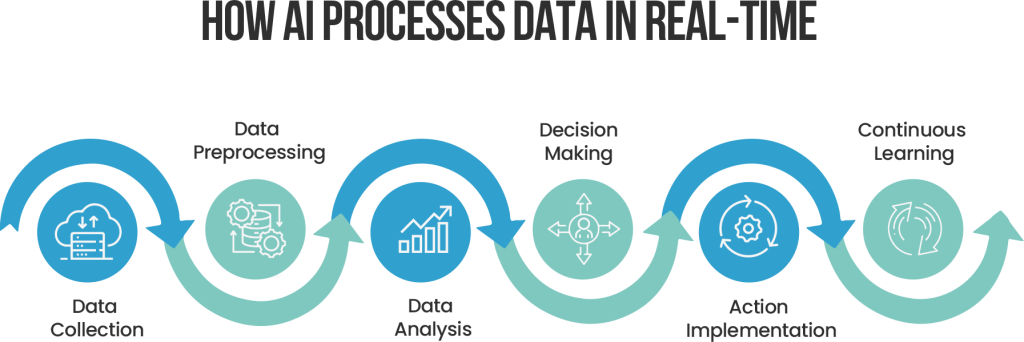
Leveraging Predictive Analytics in eCommerce
Predictive analytics is a branch of AI that analyzes historical data to make forecasts about future outcomes. In eCommerce, predictive analytics is vital for understanding customer behavior, optimizing inventory, and enhancing marketing efforts. By using machine learning algorithms, predictive models can help businesses anticipate future trends and make data-driven decisions.
For example, predictive analytics can forecast sales trends for upcoming seasons, helping businesses to adjust their inventory and avoid stock outs or overstocking.
How AI Uses Predictive Analytics for Customer Retention and Inventory Management
AI-driven predictive analytics in eCommerce enables businesses to retain customers by identifying at-risk customers and offering tailored incentives. For instance, if the system detects that a customer has not purchased in several months, it can trigger a personalized offer, such as a discount or free shipping, to re-engage them.
In terms of inventory management, predictive analytics can help retailers maintain optimal stock levels by forecasting demand. By analyzing purchase patterns, AI can determine which products are likely to be popular in the future and ensure that businesses are well-prepared.
Examples of Predictive Analytics Applications in eCommerce:
‒Sales Forecasting: AI predicts future sales based on historical data, helping retailers plan promotions and stock levels.
‒Customer Behavior Prediction: Businesses can predict what customers will likely purchase next, allowing for highly targeted product recommendations.
‒Inventory Management: AI helps retailers avoid overstock or understock by predicting future demand for certain products.
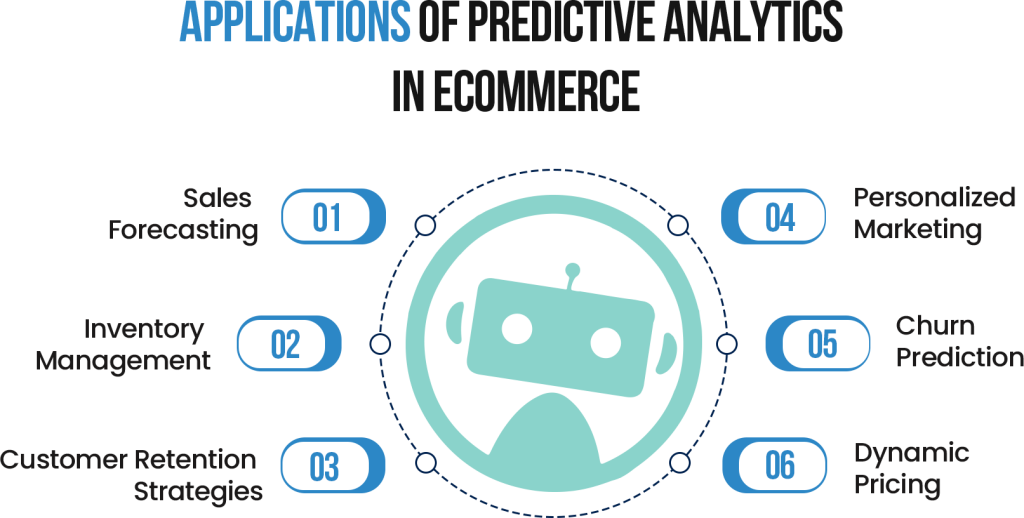
Automating Processes with AI
In the fast-paced world of online retail, manual processes can hinder growth and efficiency. AI automation in eCommerce is changing that by streamlining tasks that traditionally required human intervention. From inventory management to pricing strategies, AI is helping businesses save time, reduce errors, and improve scalability.
Applications of AI in eCommerce Automation
- Automated Inventory Management: AI automates inventory tracking, restocking, and forecasting, ensuring that retailers never run out of popular products while avoiding overstock. By analyzing sales patterns, it predicts future demand and adjusts inventory levels in real time, helping businesses stay agile.
- Dynamic Pricing Algorithms: AI-driven dynamic pricing algorithms enable retailers to adjust prices based on market demand, competitor pricing, and customer behavior. This allows businesses to maximize profits by offering the right price at the right time, increasing competitiveness in a crowded marketplace.
- AI for Fraud Detection: AI enhances fraud detection by continuously monitoring transactions and identifying unusual patterns that indicate fraud. AI to detect fraud in online transactions operates in real-time, flagging suspicious activity and preventing chargebacks or losses, protecting both the retailer and the customer.
AI in Customer Support
Providing excellent customer service is crucial for retaining customers, but handling large volumes of queries can be challenging for businesses. AI customer support systems are stepping in to alleviate this burden. By using chatbots and virtual assistants, companies can offer quick, 24/7 support that meets customer expectations without overwhelming support teams.
Chatbots and Virtual Assistants for Improved Customer Interactions
AI-powered chatbots and virtual assistants help businesses engage with customers efficiently by answering common queries, providing product recommendations, and resolving issues instantly. These AI systems learn from customer interactions, improving over time and providing more accurate responses.
For example, a chatbot can help customers track their orders, recommend products based on past purchases, or provide answers to frequently asked questions—saving time for both the customer and the support team.
Benefits of AI-Driven Customer Support
- Reduced Response Times: AI-driven systems provide instant responses, significantly reducing wait times for customers.
- Improved Customer Satisfaction: With quicker resolutions and around-the-clock availability, customers enjoy a smoother experience, leading to higher satisfaction and loyalty.
- Cost Efficiency: Automating customer support processes reduces the need for large support teams, allowing businesses to operate more efficiently.
Challenges and Considerations
While the benefits of AI in eCommerce are undeniable, businesses may face several challenges when integrating AI-driven solutions. These challenges include:
- Data Privacy Concerns: With AI relying heavily on data collection, businesses must ensure compliance with data privacy regulations, such as GDPR. Mishandling customer data can lead to significant legal and reputational risks.
- Cost of Implementation: Implementing AI technology can be expensive, especially for small to medium-sized businesses. From initial setup to ongoing maintenance, the costs can quickly add up, making AI adoption seem daunting.
- Integration Complexity: Integrating AI with existing systems can be technically challenging, requiring specialized expertise and potential changes to business infrastructure.
Overcoming AI Implementation Challenges
To address these challenges, businesses can consider several strategies:
- Leverage Third-Party Expertise: Partnering with AI service providers or consultants can help streamline implementation, especially for businesses lacking in-house expertise. These experts can guide companies through the process, ensuring smooth integration.
- Focus on Scalable Solutions: Rather than implementing AI across all operations at once, businesses can start with scalable AI solutions tailored to their immediate needs—such as chatbots or predictive analytics—and gradually expand usage.
- Stay Updated on Compliance: Businesses should stay informed about evolving data privacy laws and invest in tools that prioritize data security. This will help mitigate risks associated with data handling and regulatory compliance.
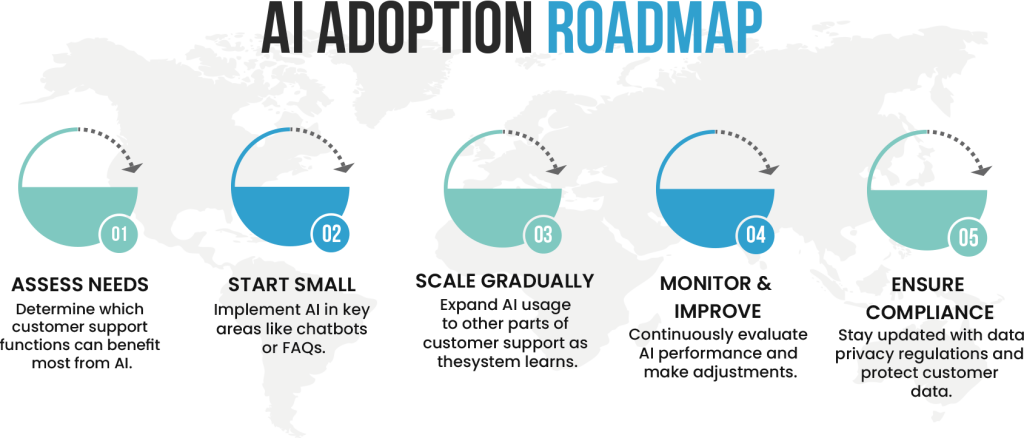
Conclusion
AI is transforming the eCommerce landscape, offering unprecedented opportunities for personalization, efficiency, and customer satisfaction. From AI-powered personalization to real-time data optimization, businesses can leverage these technologies to gain a competitive edge and deliver superior customer experiences.
However, while the potential is vast, companies must also navigate the challenges of AI implementation, including privacy concerns and high costs. By adopting scalable strategies and partnering with experts, businesses can unlock the full potential of AI in eCommerce, enhancing both operational efficiency and customer loyalty.
